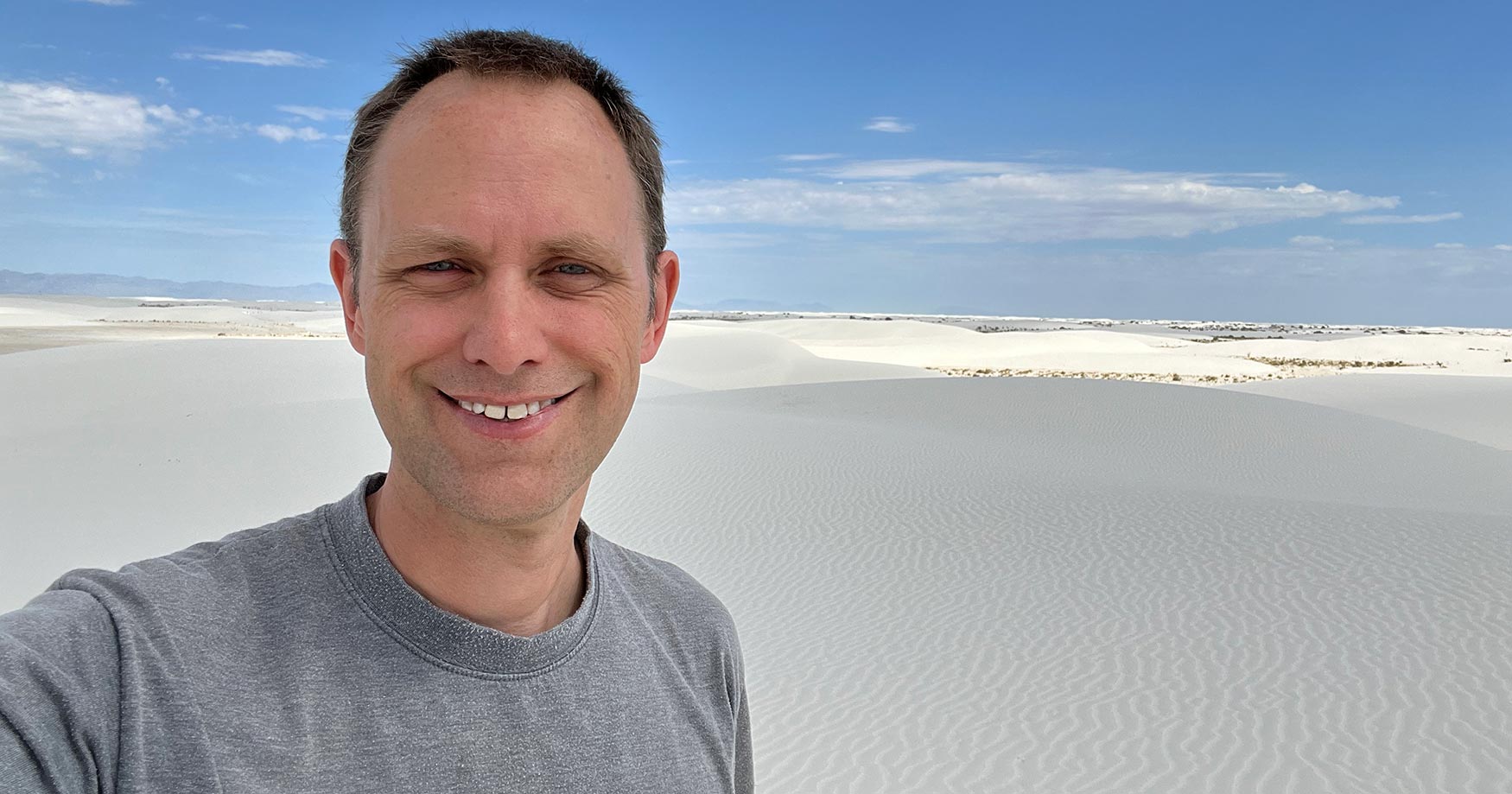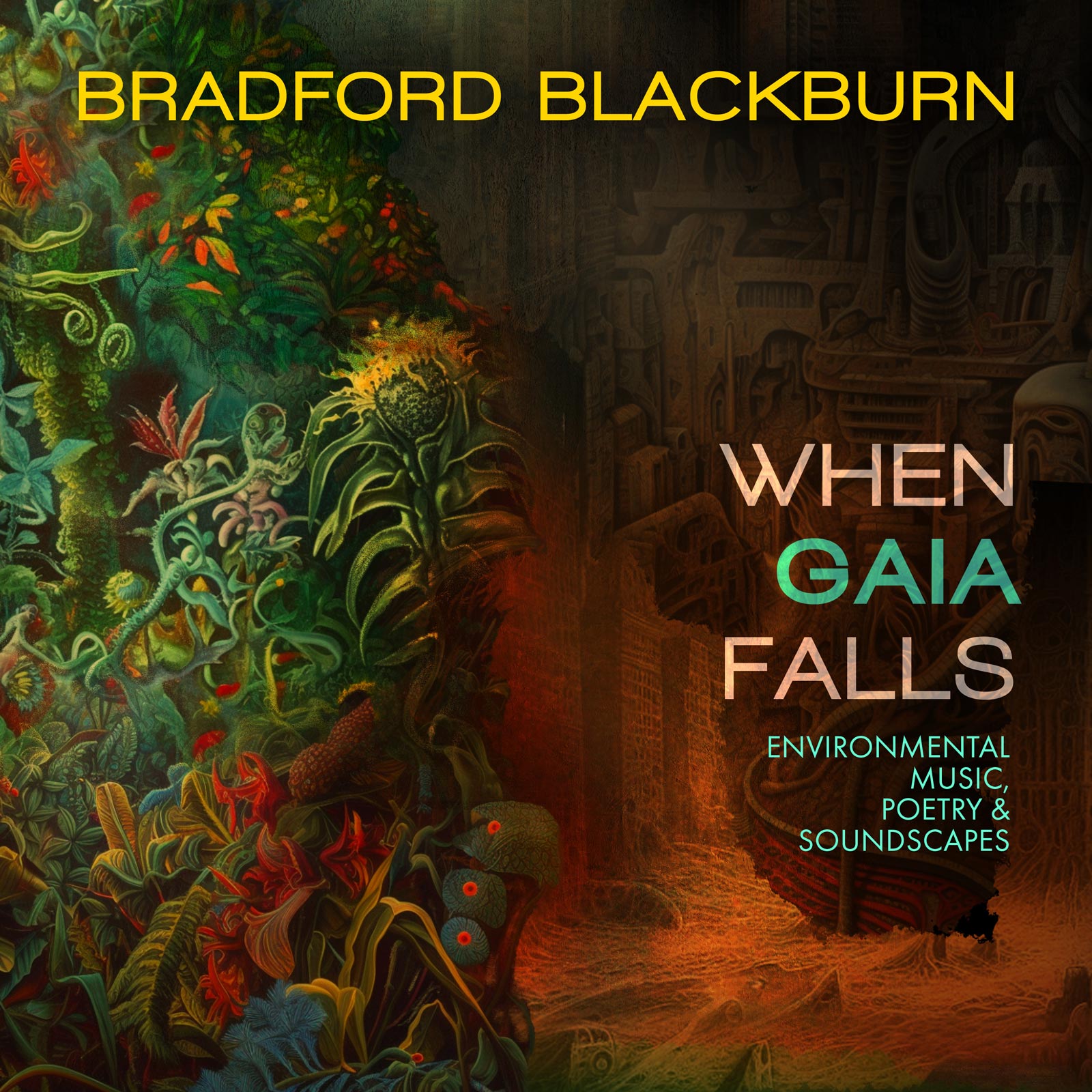WHEN GAIA FALLS from composer Bradford Blackburn is an environmental call for action in the face of climate change manifested through musical, literary, and sonic eclecticism as a medium of universality. Its central message? There is no better time to save the future than the present. From the body of electroacoustic, choral, and chamber works emerge a trio of narrative sub texts. The first, to simplify our needs and desires, the second, to make ecologically sustainable choices, and the third, to pursue positive change as a society.
Today, Bradford is our featured artist in “The Inside Story,” a blog series exploring the inner workings and personalities of our composers and performers. Read on to learn about the Moog synthesizer that kickstarted his artistic journey, and the passion he has for the great outdoors…
What have been your biggest inspirations on your musical journey?
As a composer, I love discovering music that is innovative and experimental, and I also love learning from the history of music traditions and cultures. I am inspired by the process of exploring a new medium, whether it’s a musical genre, a new instrument, or new technology. Additionally, I really enjoy collaborating with performers and creating music that highlights their unique qualities. In producing the album, WHEN GAIA FALLS, I have been fortunate to share this journey with some of my favorite collaborators and have composed with their expressive voices in mind. Apart from musical sources of inspiration, I am deeply inspired by the natural world. I feel that my musical connection with nature has grown over the years, to the point where being immersed in a wilderness landscape seems just as aesthetically inspiring to me as listening to a symphony.
Take us on a walk through your musical library. What record gets the most plays? Are there any “deep cuts” that you particularly enjoy?
Probably half of my music library is Western art music, from antiquity to the present (including electronic music), another quarter is rock, blues, and jazz, and the last quarter is a wide array of traditional music from around the world, as well as albums from friends and colleagues. The album that has gotten the most plays in my collection is very likely Glenn Gould’s 1981 recording of J.S. Bach’s Goldberg Variations. This is because I am captivated by artists, like Gould, who have a unique intellectual underpinning for their creative decisions. For a “deep cut” artist, I really like the music of Harry Partch, especially his use of extended just intonation and his unique menagerie of original instruments built largely from recycled materials. I have even gone so far as to build replicas of some of Partch’s instruments to try and better understand what his musical intentions may have been when composing.
What emotions do you hope listeners will experience after hearing your work?
My hope for WHEN GAIA FALLS is that it may raise concern about the rising tide of human-driven environmental degradation, and motivate listeners to action. The coupling of music and sound carries emotional resonance, and it is through emotional empathy that listeners might become inspired to make incremental changes in their lives that can have a positive impact. To that end, I sought to create an album that sets the tone for where we are, what is at stake, where we are headed, and where we need to go to preserve the Earth’s ecosystems for the future. Ideally, the album should be listened to as a continuous multi-movement work, in order to feel the emotional arc of this message. While the emotions are not intended to be prescriptive, there is an emotional narrative that flows throughout the album, culminating in a catharsis and call to action at the end.
What were your first musical experiences?
A lot of my early exposure to music came from listening to my parents’ collection of vinyl records from the 1950’s and 1960’s. My mother had lots of old 45 rpm singles that I would play back at different speeds for fun, and my father had acquired a lot of classical music, world music, and psychedelic rock music albums through his time in college working at a radio station. While in elementary school, I was primed to be an electronic musician by a fortuitous circumstance. A cluster of suitcase-style Moog synthesizers (Sonic Sixes, I believe) arrived at our public school, on loan from Moog Music, Inc. The company had been relocated to the Buffalo area around that time. At an impressionable young age, we were given the assignment of drawing pictures, then creating electronic music to underscore them using the synths. My brain was permanently wired for electronic music after that! Later in grade school I drifted from trumpet to bassoon, before diving into rock music in high school, and then New Music (i.e., modern classical music) in college as a composer.
What are your other passions besides music?
I think my greatest passion, outside of music, is exploring wilderness areas, whether by experiencing them first hand, or learning about them through books, articles, and media. Recently I traveled around the Southwest United States and visited a number of spectacular national parks, state parks, and national monuments. Among the most challenging yet fulfilling places I visited and camped at was Organ Pipe Cactus National Monument in the Sonoran Desert (in the middle of an epic July heat wave!), where I saw a breathtaking view of the Milky Way, and witnessed the nocturnal flowering of the organ pipe cactuses in the park. The experience for me was a stunning reminder of how lucky we are to be alive while there is so much beauty in the world, and how much we take for granted.
What’s the greatest performance you’ve ever seen, and what made it special?
Probably the greatest performance I’ve seen was not actually a musical performance, but a rare astronomical event. In August 2017, I made a point of witnessing the “Great American Eclipse,” as it was called in the media. There was drama involved in that I had to seek out the optimal viewing site with the greatest chance of clear skies at the time of the solar eclipse. I chose a spot on the beach at Tugaloo State Park, near the Georgia-South Carolina border. As the crepuscular glow of the eclipse began in the mid-afternoon, the birds and insects by the shore were fooled into beginning their evening sonic rituals, creating a surreal prelude for what was to follow. A cloud had covered the sun prior to the eclipse, but then withdrew just in time, as the insects and birds fell silent. Within a few moments, the eclipse reached its totality. The corona of the sun flared around the silhouetted moon, seeming to dance around it with liquid undulation. The complete event was relatively short, but the magnitude of its effect was powerful and unforgettable. In short, it embodied everything that a great performance might aspire to achieve!
Explore Bradford Blackburn’s Latest Release
WHEN GAIA FALLS
WHEN GAIA FALLS is available now from Big Round Records. Click here to visit the catalog page and explore this album.
The views and opinions expressed in this post are those of the artist and do not necessarily represent or reflect the views and opinions held by PARMA Recordings LLC and its label imprints, subsidiaries, and affiliates.




